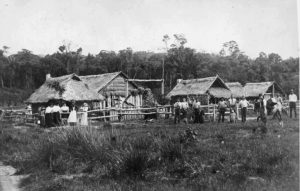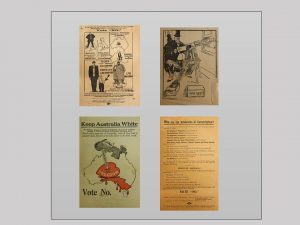Ernie Lane was born in 1868 in Bristol, England, the youngest of five brothers. He was brought up in a religious and conservative family with beliefs far from those he would hold for most of his life. Members of the family gradually migrated to Australia and Ernie arrived in Brisbane in 1884, aged just 15. His older brother Will arrived two years later having been in the USA for a few years. Under his influence Ernie became, in his own words, “a passionate rebel against all those sacred things that in my earlier years had been held inviolate and unassailable”.
Ernie’s brother Will founded the socialist utopian colony of New Australia in Paraguay in 1893. Ernie was keen to go but he didn’t have the £60 required to take part.
Ernie moved around working as a offsider to shearer’s cooks, prospecting for gold and spending time as a ship’s crewman. He travelled to the USA where he worked for some years and returned to Australia in 1890. After living in Sydney for a few years working in a grocery store, he returned to Brisbane in 1893 where he met Mabel Gray. They were married in 1895.
Mabel was born in Ballarat in 1870 and her family had later moved to Brisbane where she attended the Normal School. She worked as a milliner and became involved in the struggle to improve working conditions, joining the Early Closing Association. At that time, it wasn’t uncommon for shop assistants to work from early morning until 9pm and even later on Saturdays.
She assisted Emma Miller with the Prisoner’s Relief Fund for the 13 unionists of the 1891 Shearer’s Strike jailed for sedition and conspiracy. It was at the celebration of their release where Ernie met Mabel.
Mabel was also an active member of the Women’s Equal Franchise Association which campaigned for universal franchise for all women, as opposed to the more restrictive goal of other groups. Ernie described her as “a natural Communist who had lived Communism all her life”.
The couple lived in West End. Ernie worked at various stores as a sales assistant including Heaslop’s cash and carry grocery store at Woolloongabba. He became involved in socialist activities and was one of the founders and a driving force of the Brisbane branch of the Socialist League and later the Socialist Democratic Vanguard. Due to the reputation he gained from involvement in associated activities, he progressively found employment more difficult.
The Lanes left for the colony of Cosme in 1903 along with the three of their four children who had been born by that time. This move had taken a lot of effort including taking on a boarder for some years to save for the travel costs of the whole family.
Cosme was a breakaway colony from New Australia in Uruguay founded by Will Lane following disagreements with other colonists on issues such as alcohol and relationships with indigenous Paraguayans. Will later left and another brother John Lane became the leader, recruiting Ernie and Mabel on a trip to Australia in 1901.

New Australia in recent times where some descendants of Australian settlers still live.(Kate Granville-Jones, Argentina Independent)
They stayed for a little over a year and left, disillusioned by the non-communist spirit of the place and recognising the needs of their young family
In a 1953 interview, Ernie also commented that “Cosme was different. The large cause of failure there was the presence of more men than women”. The hardships of life in the colony fell particularly heavily on the women.
After living in Buenos Aires for several years where Ernie worked in a meat works, the Lanes returned to Brisbane . Ernie seemed glad to be back from the interviews he gave about his experience.
The idea of farming didn’t eventuate and Mabel searched for a new home in Brisbane. She eventually found a location that met their needs in Dauphin Terrace, Highgate Hill. They named the house “Cosme” after the colony in Paraguay and they were to live there for over 40 years.
Ernie described the location in his autobiography.
“Apart from the outlook, the immediate surroundings of “Cosme” are unique, inasmuch as it is practically in the bush though so close to the centre of the city. Our “gully” is always a sheer delight with its wealth of trees and shrubs and its peaceful solitude. Gum trees, palms, bamboos, tree ferns, mangoes, papaws, poinciana, bougainvillea, poinsettia, and frangipanni, with creepers and a sequestered lawn make “Cosme” a real dream of beauty.”
Cosme backed onto the gully that was the scene of a protracted battle against redevelopment in 2001.
The house was not only the centre of family life, but also the centre of their political activities and a meeting place for the rebel fraternity. In the 1940s, the Commonwealth Police, at the time focussed on suppressing left-wing groups, had the house under surveillance.
Mabel resumed her involvement in the local Labor Party. Ernie became heavily involved in the Amalgamated Workers’ Association and later the Australian Workers’ Union. In 1915, he was appointed industrial writer with the Union owned Daily Standard. He wrote columns under the name ‘Jack Cade’, who was an English rebel leader in the 15th century. Here’s a typical extract of his writings from 1923.
During World War One, there were two plebiscites by which Prime Minister Billy Hughes tried to introduce conscription, with bitter divisions in the community over the issue.
Lane was a founder of the radical Anti-Conscription and Anti-Militarist League in August 1915 which was very effective in countering the pro-conscription groups. He was also chairman of the Literature Committee of the Queensland Anti-conscription Campaign Committee which produced a large variety of posters and leaflets.
Whilst both advertising for and against conscription was common, some anti-conscription propaganda was banned by the censor who had strong war time powers. Many of Lane’s “Jack Cade” articles were heavily censored, some totally. There was a constant risk of falling afoul of the War Precautions Act with the possibility of fines and jailing.
Ernie often took great personal risks in his fight against conscription. This extract from his autobiography concerns the famous “Blood Vote” poem and poster.
‘About three weeks before polling day the “blood-vote” poem by Winspeare was published in the Sydney “Worker” and passed by the New South Wales censor. I wrote it up a little, and sent it to the censor for endorsement. He flatly refused to pass it, although it had been approved in New South Wales, and threatened full penalties if we used it. Realising the great value of this poem, I determined to defy the censor and flood Queensland with it. But the next issue of the Sydney “Worker” had improved on it by adding the powerful cartoon of the woman dropping her “blood-vote” into the ballot box. As all wires and letters were censored by the military, I sent the following cryptic wire to the private address of a comrade in Sydney: “Send by rail immediately 50,000 Winspeare pencils.”
The cryptic reference refers to the pencil at the top of the poster. Whilst the poster refers to the author as W.R. Winspear, it was actually written by E. J. Dempsey, a leader-writer on the pro-conscription Evening News. He wanted to remain anonymous and asked Winspear to sign the poem.
Mabel became a key figure in the Brisbane Branch of the Women’s Peace Army, which was also very active in anti-conscription, serving as Vice-President.
In 1924, all Australian Labor party members were required to sign an anti-Communist pledge. Both Ernie and Mabel Lane strongly opposed the idea and they left the party as a result.
Ernie remained working as a journalist on the “Daily Standard” until he was fired in 1931, despite Union protests, due to control of the paper moving away from the left wing unions. He went on to work at the Daily Mail reporting on union affairs. The Daily Mail and the Courier merged soon after to form the Courier-Mail and Ernie continued to work for the newspaper until 1937 when he was dismissed at almost 69 years of age.
Ernie Lane (State Library of Queensland courtesy of Iris Lane)
In retirement in 1939 he wrote an autobiography entitled “From Dawn to Dusk”.
Ernie and Mabel continued to live in Dauphin Terrace with long stays at another home at Currumbin, until around 1953 when the Courier-Mail ran a two part story on his reminiscence.
Ernie wrote occasional feature articles and had speaking engagements. The article below appeared in the Sydney based communist newspaper “The Tribune” and marked the 36th anniversary of the Russian Revolution. In the article, Ernie expresses his continuing faith in the future of communism.
Ernie passed away shortly after in 1954 and Mabel followed in 1955.
Further reading:
“The Conscientious Communist” by Jeff Rickertt.
Ernie Lane Autobography “Dawn To Dusk”
For further reading on New Australia, this article with photos is interesting.
There a discussion of Ernie and Mabel Lane on this UQ page.
Republished with permission – see original HERE













